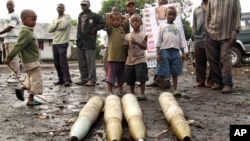GENEVA —
The United Nations Children’s Fund (UNICEF) says children are among the main victims of the clashes involving M23 rebels in the eastern Democratic Republic of the Congo. The U.N. agency says children under age 18 comprise more than half of the 100,000 people reportedly uprooted by the fighting and the capture of the city of Goma.
UNICEF is stepping up support to thousands of children caught on the front lines in eastern Democratic Republic of Congo. It says aid workers on the ground are delivering urgent supplies to children and their families.
According to the United Nations, recent attacks launched by the rebel group M23 in North Kivu province have forced thousands of already-displaced men, women and children to flee again. Among them are an estimated 60,000 people who fled Kanyaruchinya camp, some 10 kilometers from the provincial capital, Goma.
Humanitarian agencies reportedly have identified three sites in Goma which will be able to shelter and care for many of the newly-displaced. UNICEF says 8,000 people, including significant numbers of unaccompanied children, are sheltering at the Catholic Don Bosco center in Goma.
It warns overcrowding in the area and the rainy season are increasing the threat of diarrheal diseases and cholera. It notes four cases of cholera already have been reported at the Don Bosco site.
UNICEF spokeswoman, Marixie Mercado, says population movements increase the risk of cholera.
“Cholera was already present in the Kanyaruchinya camp and in Goma, and the camps that are receiving displaced people are seriously short of water and sanitation facilities," said Mercado. "Last week in Goma, a sudden power outage caused serious water shortages, forcing many residents to drink lake water, and this heightens the risk of waterborne disease even more.”
So far this year, latest figures put the number of cholera cases in the DRC at more than 27,000. Mercado says water, sanitation and hygiene are the most urgent humanitarian needs, along with food, nutrition supplies, and tarpaulins for shelter.
In the meantime, the U.N. Organization for the Coordination of Humanitarian Affairs says it is increasingly difficult to carry out humanitarian operations in eastern Congo.
OCHA spokesman, Jens Laerke, says the unrest is putting at risk thousands of people who depend upon international aid and are not receiving it.
“The neighboring South Kivu province is also affected by the very poor security situation, which has also led to suspension or reduction of some humanitarian activities in some areas there," said Laerke. "Also, in South Kivu as a consequence, thousands of vulnerable people are not receiving the assistance they urgently need. Humanitarian workers are also increasingly being targeted in the eastern DRC. Since the beginning of the year, aid workers have been targeted in nearly 170 security incidents in the two provinces.”
OCHA is calling on the Congolese authorities to protect civilians and humanitarian workers and to provide unhindered access to people in need.
The United Nations reports more than 2.4 million people are internally displaced in the DRC as a result of violence and conflict and 4.5 million people throughout the country are suffering from food insecurity.
UNICEF says 60 percent of the IDPs are women and children.
UNICEF is stepping up support to thousands of children caught on the front lines in eastern Democratic Republic of Congo. It says aid workers on the ground are delivering urgent supplies to children and their families.
According to the United Nations, recent attacks launched by the rebel group M23 in North Kivu province have forced thousands of already-displaced men, women and children to flee again. Among them are an estimated 60,000 people who fled Kanyaruchinya camp, some 10 kilometers from the provincial capital, Goma.
Humanitarian agencies reportedly have identified three sites in Goma which will be able to shelter and care for many of the newly-displaced. UNICEF says 8,000 people, including significant numbers of unaccompanied children, are sheltering at the Catholic Don Bosco center in Goma.
It warns overcrowding in the area and the rainy season are increasing the threat of diarrheal diseases and cholera. It notes four cases of cholera already have been reported at the Don Bosco site.
UNICEF spokeswoman, Marixie Mercado, says population movements increase the risk of cholera.
“Cholera was already present in the Kanyaruchinya camp and in Goma, and the camps that are receiving displaced people are seriously short of water and sanitation facilities," said Mercado. "Last week in Goma, a sudden power outage caused serious water shortages, forcing many residents to drink lake water, and this heightens the risk of waterborne disease even more.”
So far this year, latest figures put the number of cholera cases in the DRC at more than 27,000. Mercado says water, sanitation and hygiene are the most urgent humanitarian needs, along with food, nutrition supplies, and tarpaulins for shelter.
In the meantime, the U.N. Organization for the Coordination of Humanitarian Affairs says it is increasingly difficult to carry out humanitarian operations in eastern Congo.
OCHA spokesman, Jens Laerke, says the unrest is putting at risk thousands of people who depend upon international aid and are not receiving it.
“The neighboring South Kivu province is also affected by the very poor security situation, which has also led to suspension or reduction of some humanitarian activities in some areas there," said Laerke. "Also, in South Kivu as a consequence, thousands of vulnerable people are not receiving the assistance they urgently need. Humanitarian workers are also increasingly being targeted in the eastern DRC. Since the beginning of the year, aid workers have been targeted in nearly 170 security incidents in the two provinces.”
OCHA is calling on the Congolese authorities to protect civilians and humanitarian workers and to provide unhindered access to people in need.
The United Nations reports more than 2.4 million people are internally displaced in the DRC as a result of violence and conflict and 4.5 million people throughout the country are suffering from food insecurity.
UNICEF says 60 percent of the IDPs are women and children.




